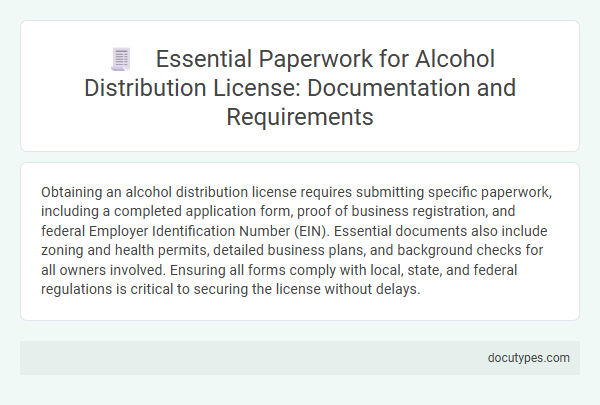Obtaining an alcohol distribution license requires submitting specific paperwork, including a completed application form, proof of business registration, and federal Employer Identification Number (EIN). Essential documents also include zoning and health permits, detailed business plans, and background checks for all owners involved. Ensuring all forms comply with local, state, and federal regulations is critical to securing the license without delays.
Introduction to Alcohol Distribution Licensing
Obtaining an alcohol distribution license requires submitting specific paperwork to comply with federal and state regulations. Essential documents often include an application form, proof of business registration, and background checks. You must ensure all paperwork is accurately completed to secure the necessary permissions for legal alcohol distribution.
Importance of Proper Documentation
| Essential Paperwork for Alcohol Distribution License | Importance |
|---|---|
| Business Registration Documents | Verifies legal entity status and eligibility to operate in the alcohol distribution sector. |
| Federal Employer Identification Number (EIN) | Allows tax identification and establishes compliance with federal tax regulations. |
| State Alcohol Distribution License Application | Crucial for legal authorization to distribute alcoholic beverages within the state jurisdiction. |
| Background Check Reports | Ensures distributors meet legal and ethical standards, reducing risks of illicit activities. |
| Proof of Premises Ownership or Lease Agreement | Confirms the physical location is secured and compliant with zoning laws for alcohol distribution. |
| Insurance Certificates | Protects against liabilities and demonstrates financial responsibility in handling alcohol products. |
| Tax Clearance Certificates | Confirms that all relevant state and local taxes have been paid and helps avoid legal complications. |
| Compliance with Health and Safety Regulations | Ensures that alcohol handling meets state health codes to maintain public safety. |
| Statement of Business Activities | Details the nature of alcohol distribution operations, essential for regulatory transparency. |
Proper documentation plays a vital role in obtaining and maintaining your alcohol distribution license. Incomplete or inaccurate paperwork can lead to application delays, legal penalties, or denial of licensing. Ensuring each document is accurate, complete, and timely submitted streamlines the approval process and supports compliance with all regulatory requirements.
Application Forms and Submission Process
Obtaining an alcohol distribution license requires precise paperwork to ensure legal compliance. The primary documents include completed application forms and adherence to the official submission process.
- Application Forms - These forms collect essential business and personal information required for license evaluation.
- Submission Process - Applicants must submit all documents to the relevant regulatory authority via outlined channels, such as online portals or in-person delivery.
- Supporting Documentation - Additional paperwork like proof of business registration and background checks may accompany the application forms.
Proof of Business Entity and Registration
Obtaining an alcohol distribution license requires specific paperwork to verify your business legitimacy. Proof of business entity and proper registration documents play a crucial role in this process.
- Business Entity Documentation - Official documents such as articles of incorporation or partnership agreements confirm the legal structure of your business.
- State and Local Registration - Registration certificates from state and local authorities demonstrate compliance with regional regulations.
- Federal Employer Identification Number (EIN) - The EIN issued by the IRS is necessary to identify your business for tax purposes and is often required for licensing.
Background Checks and Personal Information
Obtaining an alcohol distribution license requires submitting specific paperwork that includes detailed background checks and personal information. These documents ensure compliance with legal standards and verify the eligibility of the applicant.
- Background Checks - Criminal history reports are mandatory to assess any prior offenses that might disqualify the applicant.
- Personal Identification - Valid government-issued identification must be provided to confirm the identity of the licensee.
- Residency Information - Proof of residence is often required to establish jurisdictional authority and regulatory compliance.
Submitting accurate background checks and comprehensive personal information is essential for the successful approval of an alcohol distribution license.
Zoning and Location Approvals
Obtaining zoning and location approvals is a critical step in securing an alcohol distribution license. These approvals ensure that the proposed distribution site complies with local land use regulations and is appropriately situated within designated commercial or industrial zones.
Local zoning ordinances often restrict alcohol distribution to specific areas to prevent conflicts with residential neighborhoods or sensitive locations. Submitting detailed site plans and obtaining permits from municipal planning departments are essential components of this approval process.
Financial Statements and Tax Records
Obtaining an alcohol distribution license requires submitting detailed financial statements that demonstrate the business's fiscal responsibility and stability. Accurate tax records, including recent returns and payment histories, are essential to verify compliance with state and federal tax laws. These documents help regulatory authorities assess the applicant's financial integrity before granting the license.
Health and Safety Compliance Certificates
Health and Safety Compliance Certificates are crucial documents required for obtaining an alcohol distribution license. These certificates demonstrate that your business adheres to local and national health regulations.
Inspections typically assess sanitation practices, employee training, and proper storage conditions. Ensuring these certificates are current helps maintain legal operation and public safety standards.
Training and Certification Requirements
What training and certification requirements are essential for obtaining an alcohol distribution license? Proper completion of state-mandated alcohol server training ensures compliance with local laws and promotes responsible distribution practices. Certification from recognized programs validates the distributor's knowledge of legal guidelines and safety protocols.
Which Paperwork Is Essential for Alcohol Distribution License? Infographic

